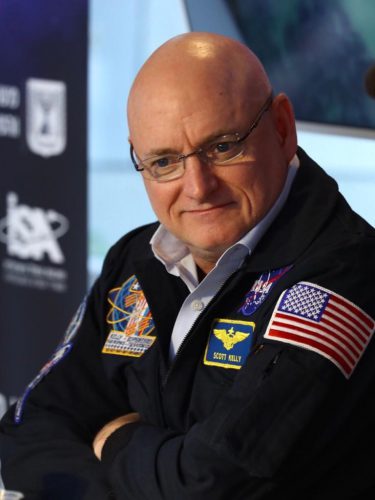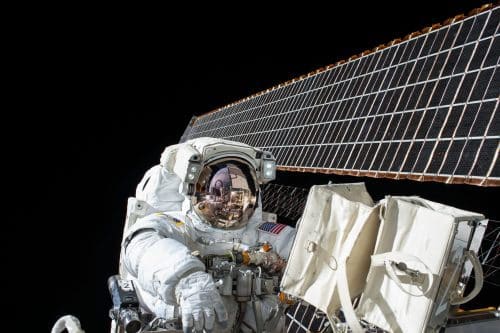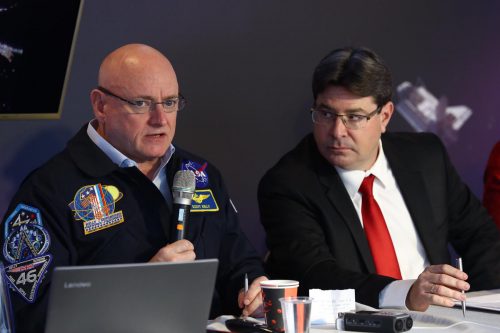This is according to a press conference held by Kelly at the event to open Space Week held in Planatania * According to him, reaching Mars depends on political will to bring money with it and not on technology

7% of the genetic expressions in former astronaut Scott Kelly's DNA changed after spending a whole year on the International Space Station. This is according to a press conference held by Kelly at an event held in Planantania to open Space Week with the participation of Science Minister Akunis and Mayor Miriam Fierberg Icher. According to him, these changes of turning genes on and turning others off are irreversible, at least so far, and it is not known what the effect of this will be in the future.
"People often ask me what is the best part about being an astronaut. I had the amazing experience of launching, landing and floating in zero gravity, but for me the most important thing about astronaut work in space or on the ground is that we do difficult and challenging things."
"I have had the privilege of flying in space four times. My first flight was the Hubble Space Telescope repair mission in 1999. The second time I was a space shuttle commander, the third time I stayed at the space station for a while, and the last and fourth time was a one-year stay in space together with my friend Misha.
This is good preparation for the mission to Mars, because the flight there will take about 200 days, then we are going to spend two years on the Martian soil, and another 200 days to return."
In response to the question of the science website what is his opinion about the individual ventures to Mars, such as that of Elon Musk, Kelly said: "At first I thought he was crazy, for example when he said that he would land the first stage of launchers on a rig in the middle of the sea, they mocked him, they said that NASA looked into the matter and discovered that it was Not possible. Elan Musk was very helpful to NASA. We created partnerships on the issue of sending teams to the space station. We gave them requirements and a budget and said 'bring us a spaceship'. I think there is a great partnership here. Elan Musk is a man of vision. I told myself at first that the man was crazy because NASA tested the possibility of reaching Mars years ago and came to the conclusion that it would not work. He predicted and did and I'm not saying he's crazy anymore. I was proven wrong. He is a talented person and I think he may be considered the Thomas Edison of our time."
"The human body does not manage so well in space, and there are many effects, both physiological and psychological. For example, the body loses one percent of bone mass every month of being in space, so if you don't exercise, you won't have bones. There are also effects on muscle mass, eyesight, the immune system and more. The radiation we are exposed to in space is high, and this may have a genetic effect, so the idea of spending a year in space is to learn things that will help us reach Mars one day. I'm a big believer in the moon and think we should go back there, but Mars is the pie in the sky
The shocking experience of the launch
"In March 2015, I arrived for the second time in my life at the Russian launch center in Baikonur, Kazakhstan, in Central Asia. The launch center in Baikonur is a good preparation for staying on the International Space Station, because it's in the middle of nowhere and you feel like you're already halfway to space."
Later, Kelly described the similarities and differences between the space shuttle and Soyuz. Both were built to get humans into space, but that's where the similarity ends. According to him, apart from the fact that the shuttle is a large and cumbersome vehicle, compared to the small Soyuz, the procedures are also different, in NASA launches the launch area is completely abandoned during the launch. There were maybe a hundred people walking around in Baikonur, and some of them were even smoking. I had to make my way through the crowd to get to the launcher.
He added that this is part of the cultural differences between Russia and the USA. "One of the beliefs of the Russians is that if you part with a friend, you are going to accompany him as much as possible. They are putting themselves at risk because a launcher might explode." However, Kelly emphasized that the Russians are good partners in the International Space Station, and in bringing the American crew members up in the Soyuz spacecraft."
After the astronauts have been lying in the narrow cabin of the Soyuz for about three hours, the command comes in Russian to launch and then the Soyuz rises slowly, because it does not have liquid fuel boosters like the shuttle had. "We arrive in space in nine minutes, and a few hours later we are already docked at the space station, to a place and to friends that we knew we would be with for a whole year."
"Teamwork is one of the most important things in space. Flying is the greatest team sport. We don't do anything without working with other people in collaboration."
"When I arrived at the space station everything looked and smelled the same as four years before and this is only the first day of a whole year in space. I thought it was a stupid thing to do. You can't run away anywhere, there is no Uber in space yet. Maybe one day there will be. The station is a facility the size of a football field but in practice the internal volume is much smaller. We get electricity from huge solar panels and have complicated life support systems. Among other things, we turn the urine into water and drink it again and God forbid. Anyway, despite that the water in the spacecraft is better than the water in Florida."

Conducted experiments and was also a guinea pig
During the year we performed 400 scientific experiments from various fields such as chemistry, biology, physics, materials science, combustion, medicine. We had a bunch of mice on the station. But we didn't just carry out experiments, we were the test subjects ourselves. I was constantly tested, and we compared my tests with those of my identical twin brother Mark who remained on the ground.
For example, there was a hypothesis that the telomeres, the regions in DNA that separate chromosomes, shorten in space, meaning that they age faster. But in the experiment it turned out that my telomeres are in better condition than my brother's, which is an interesting thing when there is one hypothesis and the result is exactly the opposite.
In the genetic experiments, it turned out that seven percent of the genetic expressions in my DNA had changed, that is, they were activated or deactivated in a different way than before. We don't yet know what the long-term consequences of this phenomenon are, but this is the reason why we go into space with it, to identify problems and then find solutions for them.
According to him, after landing he didn't feel so well, my skin became sensitive, his legs became soft, and it was difficult for him to stay in the sun. "But some things passed and after eight months I was able to get back to normal."
After describing, like many astronauts (including the late Ilan Ramon), the fragility of the Earth as seen from space and the hardships of the difficult Soyuz landing, Kelly summed up his journey and said: "The launch, the stay in space and the landing were all great, but the best part of it is that I I know that I have done the hardest thing I will ever have to do in my life and I am able to share this experience with my family, friends and the general public."
I'm a big believer in getting to Mars, but I don't think we should build spaceships and send us all to Mars. It will always be easier to take care of the planet than to move somewhere else. The planet seen from the window of the space station is a world without political borders. You see a planet that when we're on the bottom of it we think is big, but when you orbit it every ninety minutes in space, it's not that big, and it gave me a sense of empathy for the plight of the human race and the understanding that we need to work together to solve our problems. When asked what prevents a flight to Mars, he quoted his brother Mark as saying that sending humans to Mars is not a matter of rocket science but of political science. There needs to be political will."

The Minister of Science and Technology, Ofir Akunis said at the opening of the events: "This year we celebrate the Ilan Ramon Israeli Space Week in commemoration of the tragic passing of Rona Ramon. She has done a lot for educational activities in the years since she lost her lover and her son. With Rona's approval, the Ministry of Science launched Ilan Vasaf scholarships a year ago. The Ministry of Science has set a goal to make it accessible and this year we are changing the format of Space Week and holding a variety of open activities and you can already see the great demand to participate in the activities. Space Week this year is marked by a huge national event: in about a month, the first Israeli spacecraft is expected to land on the moon in mid-April. This is one of the most important events in the country's history. The landing of Berashit, a Space IL initiative in collaboration with the Ministry of Science, will be further proof that we are a science and technology powerhouse. Israel will be the fourth country in the world to land a spacecraft on the moon. The USA, Russia and China did it before us. I am proud that the Israeli innovation industry is part of this."
The Space Week organized by the Israel Space Agency at the Ministry of Science takes place this week, January 27 to 31, at 20 activity centers throughout the country for the whole family and for free.

5 תגובות
Itai
Here it is the "Hidan" site and not the "Stupid" site.
Laithy, I suggest you make sure to wear foil on your head, because you seem to have been adversely affected by the Masonic Hypnosis Fund
I suggest you do a little more research about the man and his work.
If I conclude that a trial, he has never been in space. There is no such thing as space the way NASA talks about it.
Health to all believers. The awakening has already begun.
My dear people - even a failure, for this matter, is a success.
For example: If the missile explodes before it even leaves the ground, it will be really bad, but the whole process is done and that in itself is not a bad achievement.
(Khoshu'd = God forbid Samson and Delilah)
Ofir Akunis: Hogar should not be glorified as a key. I really hope that the event will be successful and we will land Genesis on the moon, but another vision for the time. Don't talk about the success in the past tense ahead of time